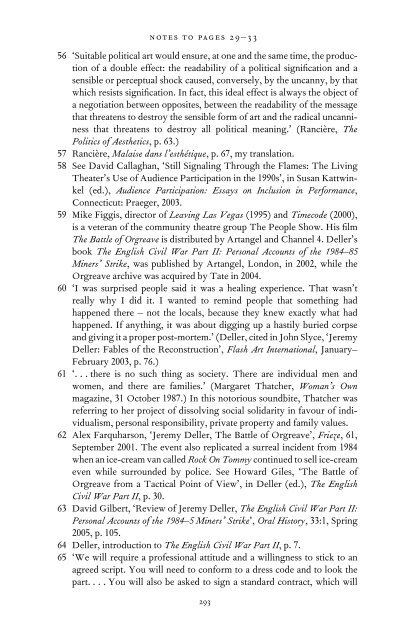Participatory Art and the Politics of Spectatorship - autonomous ...
Participatory Art and the Politics of Spectatorship - autonomous ...
Participatory Art and the Politics of Spectatorship - autonomous ...
Create successful ePaper yourself
Turn your PDF publications into a flip-book with our unique Google optimized e-Paper software.
notes to pages 29– 33<br />
56 ‘Suitable political art would ensure, at one <strong>and</strong> <strong>the</strong> same time, <strong>the</strong> production<br />
<strong>of</strong> a double effect: <strong>the</strong> readability <strong>of</strong> a political signifi cation <strong>and</strong> a<br />
sensible or perceptual shock caused, conversely, by <strong>the</strong> uncanny, by that<br />
which resists signifi cation. In fact, this ideal effect is always <strong>the</strong> object <strong>of</strong><br />
a negotiation between opposites, between <strong>the</strong> readability <strong>of</strong> <strong>the</strong> message<br />
that threatens to destroy <strong>the</strong> sensible form <strong>of</strong> art <strong>and</strong> <strong>the</strong> radical uncanniness<br />
that threatens to destroy all political meaning.’ (Rancière, The<br />
<strong>Politics</strong> <strong>of</strong> Aes<strong>the</strong>tics, p. 63.)<br />
57 Rancière, Malaise dans l’esthétique, p. 67, my translation.<br />
58 See David Callaghan, ‘Still Signaling Through <strong>the</strong> Flames: The Living<br />
Theater’s Use <strong>of</strong> Audience Participation in <strong>the</strong> 1990s’, in Susan Kattwinkel<br />
(ed.), Audience Participation: Essays on Inclusion in Performance,<br />
Connecticut: Praeger, 2003.<br />
59 Mike Figgis, director <strong>of</strong> Leaving Las Vegas (1995) <strong>and</strong> Timecode (2000),<br />
is a veteran <strong>of</strong> <strong>the</strong> community <strong>the</strong>atre group The People Show. His fi lm<br />
The Battle <strong>of</strong> Orgreave is distributed by <strong>Art</strong>angel <strong>and</strong> Channel 4. Deller’s<br />
book The English Civil War Part II: Personal Accounts <strong>of</strong> <strong>the</strong> 1984– 85<br />
Miners’ Strike, was published by <strong>Art</strong>angel, London, in 2002, while <strong>the</strong><br />
Orgreave archive was acquired by Tate in 2004.<br />
60 ‘I was surprised people said it was a healing experience. That wasn’t<br />
really why I did it. I wanted to remind people that something had<br />
happened <strong>the</strong>re – not <strong>the</strong> locals, because <strong>the</strong>y knew exactly what had<br />
happened. If anything, it was about digging up a hastily buried corpse<br />
<strong>and</strong> giving it a proper post- mortem.’ (Deller, cited in John Slyce, ‘Jeremy<br />
Deller: Fables <strong>of</strong> <strong>the</strong> Reconstruction’, Flash <strong>Art</strong> International, January–<br />
February 2003, p. 76.)<br />
61 ‘. . . <strong>the</strong>re is no such thing as society. There are individual men <strong>and</strong><br />
women, <strong>and</strong> <strong>the</strong>re are families.’ (Margaret Thatcher, Woman’s Own<br />
magazine, 31 October 1987.) In this notorious soundbite, Thatcher was<br />
referring to her project <strong>of</strong> dissolving social solidarity in favour <strong>of</strong> individualism,<br />
personal responsibility, private property <strong>and</strong> family values.<br />
62 Alex Farquharson, ‘Jeremy Deller, The Battle <strong>of</strong> Orgreave’, Frieze, 61,<br />
September 2001. The event also replicated a surreal incident from 1984<br />
when an ice- cream van called Rock On Tommy continued to sell ice- cream<br />
even while surrounded by police. See Howard Giles, ‘The Battle <strong>of</strong><br />
Orgreave from a Tactical Point <strong>of</strong> View’, in Deller (ed.), The English<br />
Civil War Part II, p. 30.<br />
63 David Gilbert, ‘Review <strong>of</strong> Jeremy Deller, The English Civil War Part II:<br />
Personal Accounts <strong>of</strong> <strong>the</strong> 1984– 5 Miners’ Strike’, Oral History, 33:1, Spring<br />
2005, p. 105.<br />
64 Deller, introduction to The English Civil War Part II, p. 7.<br />
65 ‘We will require a pr<strong>of</strong>essional attitude <strong>and</strong> a willingness to stick to an<br />
agreed script. You will need to conform to a dress code <strong>and</strong> to look <strong>the</strong><br />
part. . . . You will also be asked to sign a st<strong>and</strong>ard contract, which will<br />
293
















